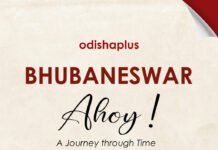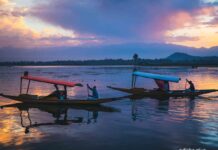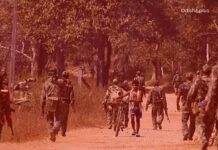Pradeep Biswal
It was the evening of 6th May, 1960. I came to this world as the first child of my parents. The village midwife performed the rituals of my birth in her traditional style. There was jubilation in the family. Besides my parents and grandparents, the neighbors and relatives poured in their blessings on me.

My mother was happy to deliver her first child and enjoy the bliss of motherhood. Father became a proud father. Our village, Rachhipur, was under Keonjhar State before independence. It was a part of Jujhapada Dandapat, comprising three villages. In our village, lower primary school history and geography of Keonjhar State was being taught before independence.
After independence, it became a part of the Cuttack district and subsequently came to be under Jajpur district after district reorganization in the nineties. There were long stretches of paddy fields around the village with patches of bushes which served as habitat for jackals and various other species. Occasionally, during summer, bears visit the village from the nearby jungles to enjoy seasonal fruits and create havoc.

In fact, fruits like mango, jamun, jackfruit etc were in plenty. Similarly, herds of monkeys come from somewhere and destroy the trees and thatched houses. There were two, three big tanks on the edges of the village and they were maintained for fishing and bathing. We practiced swimming lessons there and during summer afternoons we used to spend hours there to beat the heat.
In the swimming competition, we had to cover from one end to another. There was no tube-well those days and deep wells were used to supply drinking water. Scarcity of water was felt during summer and we used to collect water from nearby wells in the early morning in a line.

We had a big playground, and football and volleyball were being played by different groups. Once, during a football tournament, the goalkeeper from our village had a kick on his chest and he died at the spot. For a few years, the playground was out of bounds for the boys due to pressure from their parents.
There was a primary school in the village and subsequently a Middle English school was opened and I was the first to enroll. Number of girls studying in the school was around ten percent and the dropout rate was higher in their case. Many of these girls get married quite early in their school days. Even some of my classmates had the same fate and then I did not know about marriage.
Besides various festivals observed fabulously on different occasions, a drama was being staged every year with village youth. With no girl willing to join, the boys perform as women characters. I had participated in some plays as a child artist and got physical punishment from my father who usually directed these plays. Pala and Daskathia were organized on different occasions.
The entire village celebrates Raja, Prathamastami, Holi, Durga Puja, Deepavali, Kumar Purnima with fervor. The girls observe Raja and Kumar Purnima enthusiastically. For the children, these were occasions for merrymaking. They play kabaddi , football, volleyball, etc. The older male members enjoy playing cards or Pasha in groups and the women and children play Lodoo among themselves.

The Sani temple in the village was very famous in the locality and people in large numbers from nearby villages throng on the celebration of the annual day. It has become more familiar nowadays. A week long fair was held in Vyasa Sarobar close to our village and it was always a delight to visit the fair more than once. Ladies purchase their household goods from the fair. Presently, it has lost its charm with rapid urbanization, although the place has been renovated and declared as a tourist site by the State Government.
I had my schooling in the village school and the teachers were staying inside the school premises and running a mess. We were given free tuition in the evening and we used to offer rice and vegetables to the teachers every week, which sufficed to run the mess. There was a competition among the students to clean the utensils and interestingly to partake the leftovers with the intention that it may bring success in the studies. Although I used to take part in football and volleyball games, I was a poor performer and I found an escape through my interest in literature during those days. I started writing from class four and my grandfather was my inspiration for writing.

There were plenty of vegetables, fish and dairy products available in the village from local vendors and in the weekly haat in a nearby village. Every household had cows and milk was available plenty. During the rainy season, fish were caught in large quantities and people dried it to consume later as dried fish. The vendors supplying items at the doorstep used to take paddy or rice instead of cash. Barter system was still in vogue.
The harvesting season was a time for enjoyment and the children got the chance to enjoy sweets from the local sweet makers visiting the village. Fruits were forbidden items in the village and only when some guests arrived did they bring apples, grapes, etc. Or else when someone falls sick, then there’s a chance to taste it.
As the first child in the house, I had some privileges which my younger siblings could not enjoy. I had three brothers and two sisters. Another sister died when she was hardly six months old. On festive occasions, I buy two to three pairs of new dresses.

I was fond of Britannia cream biscuits and after consuming the cream I used to throw it to the dogs. Once in the late evening, I insisted on laddoos and my uncle had to go to the nearby town to fetch it for me. Once he brought it I stopped crying. Similarly, one of our neighbors, an old man, was harassing me on my way to school, and I decided to teach him a lesson.
I took out a sword from the Puja room where they were kept and inflicted an injury on him, making him bleed profusely. My mother gave me a heavy slap, but the crime was already committed. The old man pardoned me as a child and never harassed me thereafter.
My father brought a Bush radio set in the sixties and it was the only source of entertainment in our locality. There was no electricity in the village and it came in the late seventies. The day we got our house lit we could not sleep at night. Repeatedly we woke up to see the bright lights on and enjoyed the fan moving on our head.

Beforehand, we used to sleep on the veranda in the summer nights since there was unbearable heat and sweating. Each of us had a handmade fan to beat the heat. A black-and-white TV set came to our house in the eighties and the entire neighborhood assembled in our house to watch the programs.
In the mid eighties, we had a telephone connection to our house and it was the first in our village. People will come and wait for a call from their near and dear ones staying outside. There were two cinema halls in Jajpur Road and people occasionally visit the halls. During Raja, Prathamastami and Puja time new Odia films were released and women and children went to watch the films in large numbers.
Two incidents of my childhood days remain vivid in my mind. On 14th July 1969 night a train accident occurred in Jajpur Road where 85 passengers died and 130 passengers got injured. Next day morning we visited the spot to find dead bodies and mutilated body parts scattered around. I could not sleep at night seeing the horrible sight. They were mostly pilgrims from north India coming to see Nabakalebar Rath Yatra of Lord Jagannath at Puri. Next was the cyclone on 29th October 1971.
 The wind speed was about 175 kms and all the old big trees of the village got uprooted one by one in front of us. The thatched houses got badly affected and rain water poured into the houses, damaging everything. There was no space to sit or sleep. Everything got drenched in rain water. Fishes from the ponds were found swimming on the village roads.
The wind speed was about 175 kms and all the old big trees of the village got uprooted one by one in front of us. The thatched houses got badly affected and rain water poured into the houses, damaging everything. There was no space to sit or sleep. Everything got drenched in rain water. Fishes from the ponds were found swimming on the village roads.
For the next two-three days, people depended on dry food items supplied by government officials. It washed away a few villages near the sea and heavy casualties occurred in coastal districts. In fact, it was so severe that about ten thousand people and fifty thousand cattle died in the State and eight lakh houses got damaged. Life resumed again, as if nothing had happened.

(Mr. Pradeep Biswal is a bilingual poet writing both in Odia and English. His poems are widely anthologized. He is also an editor and translator of repute. A retired IAS Officer, Mr. Biswal presently holds the position of Member, Odisha Real Estate Regulatory Authority and stays with his family at Bhubaneswar. Views are Personal)
#Village #Villagedays #Nostalgic #Olddays #Childhooddays #Summerseason #Villagescenario





























I see , you sir , making me write something about my village ..
It is a nice start for a full fledged autobiography.Narration is very lucid and nostalgic.Wish the project a good success.
A sweet and honest soul like you remembers the bygone years spent in his idyllic village. Very nicely narrated the precious memories you spent.🙏🙏